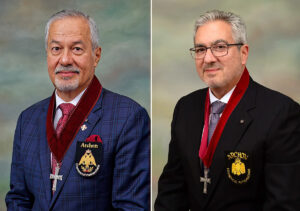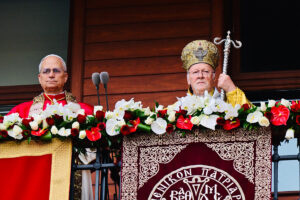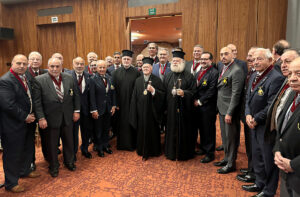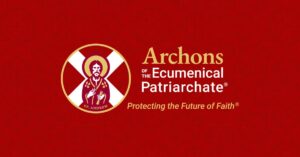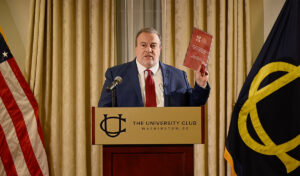The Christians of Syria are one of the oldest Christian communities in the world. Today, however, that community faces the very real possibility of being extinguished altogether. The Archons of the Ecumenical Patriarchate (AEP) recently issued an urgent call for the protection of Christians in Syria.
Before the civil war in Syria began in 2011, there were about 2.5 million Christians in Syria, including around a million Greek Orthodox believers. Today, estimates of the Christian population range from 500,000 to a million, with slightly less than half being Greek Orthodox Christians.
The Christian presence in Syria dates back to the time of the apostles, for it was in Antioch, an ancient Syrian city that is now within the borders of Turkey, that “the disciples were first called Christians” (Acts 11:26). Notable saints from Syria include Saints Luke the Evangelist, Ignatius of Antioch, John Chrysostom, John of Damascus, and many others. Founded by Saint Peter, the Patriarchate of Antioch is one of the five original Patriarchates of the early centuries of the Church.
Since 1342, the Greek Orthodox Patriarchate of Antioch and All the East has been headquartered in Damascus, and there are an estimated 4.3 million Antiochian Greek Orthodox Christians worldwide. His Beatitude Patriarch John X was enthroned on Feb. 10, 2013. Under the authority of the See of Rome are His Beatitude Ignatius Joseph III, Syriac Catholic Patriarch of Antioch; His Beatitude Bechara Boutros Rahi, Maronite Catholic Patriarch of Antioch; and His Beatitude Youssef Absi, Melkite Greek Catholic Patriarch of Antioch. His Holiness Mor Ignatius Aphrem II is the Syriac Orthodox Patriarch of Antioch. There is also in Syria a small number of Latin Rite Roman Catholics, as well as Protestant Christians.
Today, all of these Christian groups are imperiled in their ancient homeland. Crux reported on Dec. 3, 2024 that Syrian Christian leaders were “concerned over the advances of jihadist rebels in the country which include the takeover of the country’s second city, Aleppo.” Those rebels “imposed a curfew on churches,” and many feared that this would be only the beginning of a new persecution of Christians, if not outright ethnic cleansing. Shortly after that, the terrorist group al-Qaeda exhorted the rebels to attack “Jews and Crusaders,” the latter being their favored term for Christians.
Some appeared to take heed of al-Qaeda’s exhortation. On Dec. 17, 2024, gunmen attacked the Greek Orthodox Archdiocese of Hama in Western Syria, shooting at the church walls and attempting to tear down the cross atop the building. On Christmas Eve, attackers burned a Christmas tree near the Syrian city of Hama, whereupon protesters marched in Damascus to the Greek Orthodox Patriarchal headquarters, chanting: “We demand the rights of Christians.” It remains unclear, however, whether the new authorities in Syria will protect those rights.
Jamil Diyarbakirli, director of the Assyrian Monitor for Human Rights, stated: “Syria is almost emptied of the Christian component, and this is the biggest disaster. More than two-thirds of Syrian Christians have fled the country.” He added that the future for Christians in Syrian was simply “unpredictable.”
On Dec. 9, 2024, His Beatitude Patriarch John X of Antioch and All the East issued a statement, saying: “As a Church deeply rooted in this great East, we continue our mission of serving humanity and fostering peace and harmony in a nation governed by the rule of law and democratic institutions.” It appealed to all Syrians to “promote unity; protect public and private property; foster security in their communities; exercise self-restraint in the face of provocations; and approach challenges with wisdom and prudence.”
In a phone conversation on the same day with His Beatitude John X, His All-Holiness Ecumenical Patriarch Bartholomew expressed, “on behalf of the Holy Church of Christ the Great and himself personally, his intense concern for the situation of the Hierarchy, the clergy and the people of the historic Church of Antioch, and his absolute support for it, for its safety and stability.” His All-Holiness pledged “the unwavering support of the Mother Church of Constantinople,” and emphasized “the enduring unity and fraternal bonds between the two Patriarchates during these trying times.” Ecumenical Patriarch Bartholomew also “offered prayers to Almighty God, asking for peace to prevail in the hearts of all and for stability and reconciliation to be restored in Syria.”
Amid the ongoing crisis, Archon Dr. Nawaf Salameh, a native of Syria, sounds a hopeful note: “The first order of business is to establish stability and peace, to bring an end once and for all to violence. Christians, as well as Muslims, Jews, and other communities, have an abiding interest in dialogue, comity, and tolerance, built on deep respect for faith and absolute equality of all Syrian citizens.”
The government of Greece has moved to protect Christians in Syria, and Cyprus’ special envoy for religious freedom and protection of minorities in the Middle East, Salina Shambos, said on Jan. 17, 2025 said that religious leaders in Syria were working to “ensure that there’s going to be safeguards in a constitutional process that is inclusive. These are people that feel very strongly about the country. These are patriots. And they are relieved that we have the brutal regime gone. They’re concerned but they hope.”
His Beatitude Patriarch John X likewise expressed hope and continued to call for peace, saying: “We are not guests in this land, and we are not children of today or yesterday. We come from Antioch of the Apostles, from this land that has marked the universe with the name of Jesus Christ.” He added: “The Syria we want is a civil state in which everyone has the same rights and duties.”
May His Beatitude’s hopes and prayers be granted in abundance.

